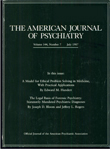In this age of high levels of compartmentalization in health care, we can all benefit from a call to pay more attention to data from other disciplines. This warning is especially important in the behavioral sciences, where the scarcity of financial resources makes it likely that individuals with substance use disorders will be treated in the mental health system and vice versa. It is difficult to conceive of an active clinical practice nowadays where understanding more about the important skills inherent in complementary disciplines would not be of benefit. The problem is to find a good place for the clinician to begin to find information about both psychotherapies and the appropriate treatment of substance use disorders.
This edited text of 16 chapters is as good a place as any to begin to address these complex questions. The book is a Whitman's Sampler of both theoretical and practical issues related to the broadly defined concept of psychotherapy and how these issues can be applied to individuals with substance use disorders. Divided into two major sections relative to the background for therapeutic understanding of issues and a review of relevant treatments (plus a short postscript), the chapters offer clinically relevant thoughts that whet one's appetite for more information.
I found some chapters more appealing than others in this edited text, which reaches across disciplines through rather broad overviews, and I am sure that many readers will agree with me. However, as a consequence of the broad audience to which this text is relevant, I am also sure that there will be disagreements about which specific chapters are more pleasing. In part 1, George Vaillant's views of the usual clinical course or natural history of the substance use disorders and how psychotherapeutic approaches might differ across this cycle is thought-provoking. I was also intrigued by Griffith Edwards' historical perspective on three major developments in therapies relevant to the substance use disorders over the last 200 years. Dr. Edwards presents the theme of the need for psychotherapies to take advantage of the natural healing processes, a thought that ties together the questions raised by Dr. Vaillant in part 1 with two treatment-related chapters on addictive behaviors and Alcoholics Anonymous in part 2. Regarding this latter and more extensive section, the reader might find especially helpful Susan Davison's chapter, on differing intensities of psychotherapy for different individuals, the reviews of cognitive and behavioral approaches by Ruth Williams and by Michael Gossop, the overview of motivational issues by Robin Davidson, and the application of these and other approaches to a group treatment setting by Wojciech Falkowski.
This book should be useful for psychotherapists who wish to apply their disciplines to the treatment of people with substance use disorders, as well as for clinicians in the alcohol and drug field, who would benefit from understanding more about the theoretical and practical background of many of the steps they find themselves taking with their patients and clients. The text could also serve as a useful stimulus for discussion in classrooms and training programs relevant to the two disciplines. Recognizing that no book can accomplish everything simultaneously, I think that readers interested in more detailed descriptions of relevant issues, as well as those already conversant with the basics of the two disciplines, might turn to more detailed texts, but they will have to pay the price of a limited amount of cross-talk between these two important clinical topics.

